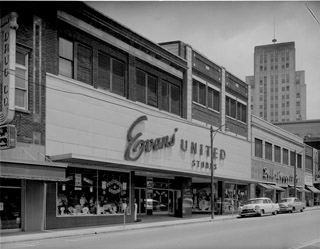Standing Together – Resisting Lunch Counter Segregation at Evans United Department Store
“Did the roof fall in today?” Mayor Mutt Evans asked the manager at Woolworth’s five and dime in the downtown Durham in July 1960. The business had just served a Coke to its first black customer. It was the start of a new era for the Bull City and as Durham’s first Jewish mayor, Mutt Evans was uniquely equipped to navigate the period’s racial tension and lead Durham towards a brighter future.
Though Evans faced intense anti-Semitic resistance during his campaign in 1950, his slogan “Equal Representation for all People” resonated with Durham’s African American community. Their support enabled him to win the election and serve Durham from1951 through 1963, the most volatile years of the civil rights struggle. Evans’ leadership was not confined, however, to his terms as mayor. He also advocated for racial justice as an ordinary citizen.
Evans and his family owned Evans United Department Store on West Main Street. The store boasted the only integrated lunch counter in downtown Durham during the 1950’s. When authorities demanded that Mr. Evans build a wall between black and white customers at the lunch counter, his refusal to compromise his company’s pro-integration stance led to an ingenious solution. By removing its seating and raising the counter to an elbow leaning height, the lunch counter at Evans United Department Store remained integrated through a technicality that allowed blacks and whites to stand, but not sit, together.
Evans United Department Store is one example of the complex relationship between Durham’s Jewish and African American communities. The proximity of Pine Street, a middle-class Jewish enclave, to Hayti, Durham’s African American neighborhood tied together the fates of the Jewish and African American communities. By catering to Durham’s underserved black community, Jewish businesses flourished and forged economic ties between the two groups. However, this economic partnership did not always lead to social harmony. For example, during Durham’s civil rights struggle, their justifiable fear of the Ku Klux Klan caused many of Durham’s Jews to remain silent or even resist integration. However, Mutt Evans resisted this pressure both through his individual activism and work in the public sphere. His bravery proved that collaboration has the power to bring honor and justice to all.
